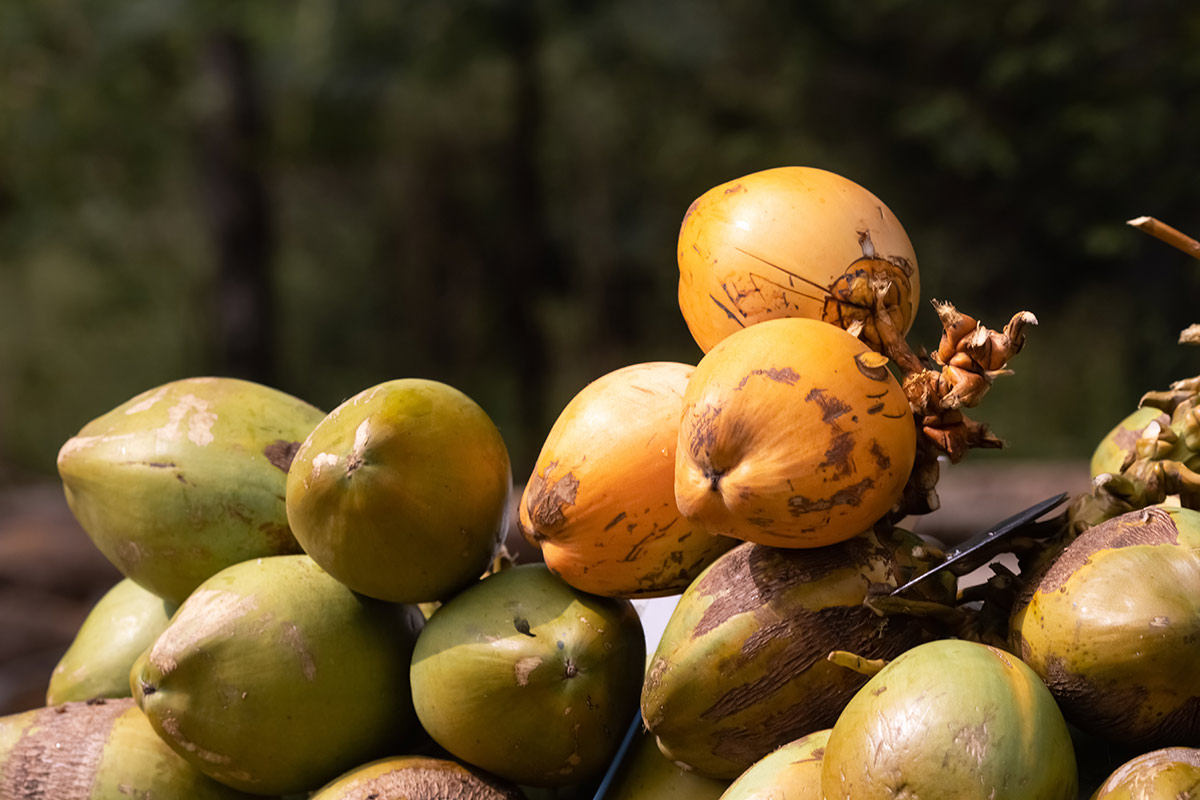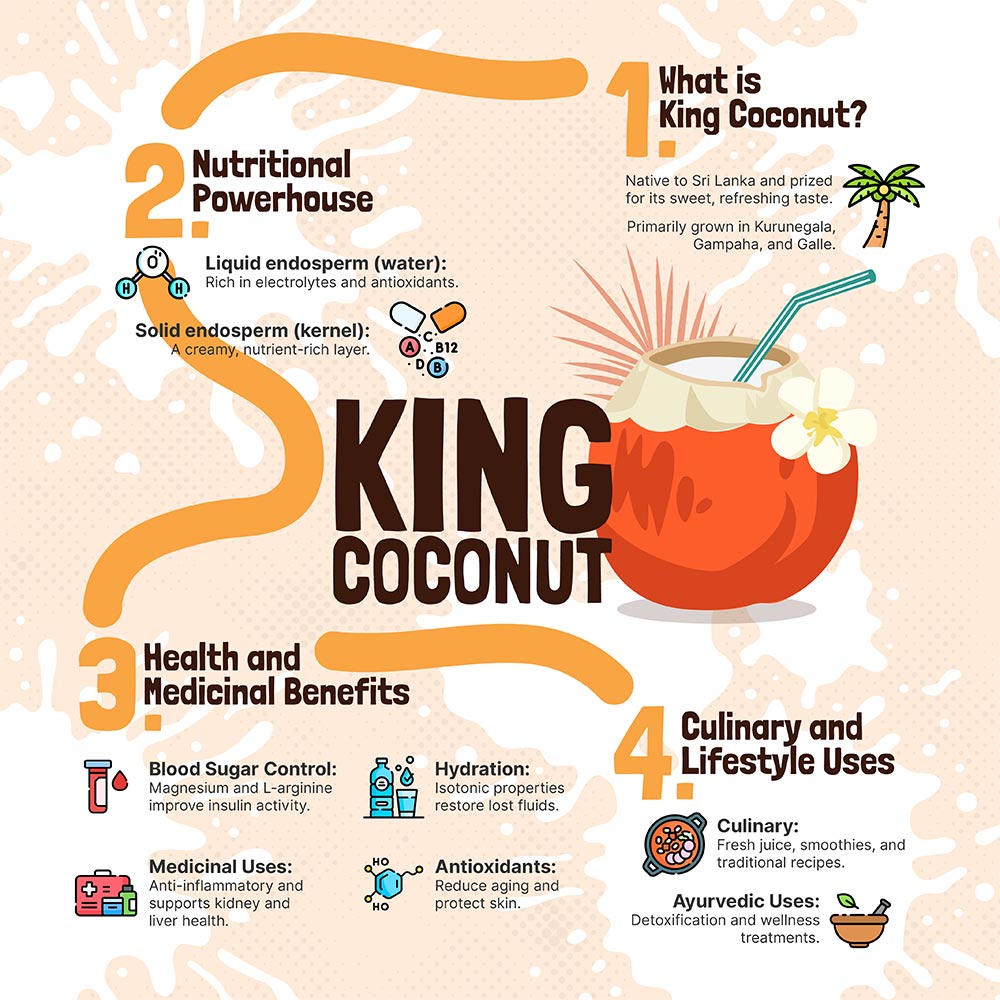

The king coconut (Cocos nucifera var. aurantiaca) is a cornerstone of Sri Lankan culture and is known as “Thambili” in the native language. With its vibrant orange husk and sweet, refreshing water, it has been cherished for generations. Not only is it a staple in Sri Lankan households, but it also plays a key role in religious and cultural practices.
Beyond its cultural significance, the king coconut is globally prized for its unique flavour and rich nutritional profile, which makes it a standout among other coconut varieties. This guide will walk you through the benefits, uses, and reasons why king coconut is truly special.
The king coconut is a unique variety of coconut indigenous to Sri Lanka. Unlike the regular green or brown coconuts, the king coconut is bright orange and primarily harvested for its water rather than its meat.
Here are some key characteristics of the king coconut:
The benefits of king coconut go beyond hydration, as it provides the body with natural electrolytes that help maintain fluid balance, support skin health, and promote overall well-being.

While both the king coconut and regular coconut are part of the same family, they are used for different purposes and have distinct attributes.

The real treasure of the king coconut lies in its water. Known for its refreshing and hydrating qualities, king coconut water is a popular beverage in Sri Lanka and globally. It’s packed with essential electrolytes, vitamins, and minerals, making it a health-conscious choice. Some key health benefits of drinking king coconut water include:
The ingredients of king coconut water are entirely natural:
Organic king coconut water is particularly valued for its purity. Miditer’s commitment to providing organic products ensures that consumers enjoy king coconut water free from chemicals or pesticides, which enhances the overall health benefits.
Understanding its nutritional benefits is key to appreciating why it’s considered a superfood. In a 100ml serving, the calories in king coconut water are remarkably low, with just around 20 calories per serving. This makes it an ideal drink for those seeking to maintain a healthy weight while still enjoying a flavorful beverage.
When it comes to king coconut water nutrition value, it is rich in essential nutrients including vitamins C and B-complex, potassium, calcium, and magnesium. The low amount of calories in king coconut water make it a guilt-free option for anyone looking to stay hydrated while keeping calorie intake in check. In comparison to other coconut products, the king coconut calories are significantly lower, making it an even healthier option.
In Sri Lanka, the king coconut drink is consumed daily, as it’s readily available and just perfect for hot weather. Its versatility extends to several culinary applications, including refreshing beverages and desserts.
Sri Lanka is the leading supplier of king coconut products, with businesses worldwide recognizing its growing demand. As more industries look to incorporate natural ingredients, king coconut suppliers in Sri Lanka are seeing increased interest in this nutrient-rich superfood.
Miditer stands out among the top king coconut water suppliers in Sri Lanka, offering a wide range of organic king coconut products. For businesses in food, beverage, cosmetics, or health supplements, Miditer provides customised B2B solutions to source natural king coconut products in Sri Lanka, ensuring that you meet the rising global demand for clean, natural ingredients.
The king coconut is more than just a refreshing drink—it’s a symbol of Sri Lankan culture and a nutritional powerhouse. The numerous health benefits of king coconut, from hydration and electrolyte balance to skin health, make it a must-try for anyone looking to improve their wellbeing and enhance their dietary habits.
Whether you’re a business looking to invest in the ever-growing demand for king coconut products in Sri Lanka or an individual curious about its health benefits, the king coconut offers something for everyone.
Explore Miditer’s range of organic coconut and king coconut products and discover how this simple fruit can make a significant impact on your health and wellness journey. If you’re curious about how you can collaborate with Miditer to create a positive impact, delivering high-quality, organic products that align with today’s health-conscious market, consider partnering with us.

Yes, you can drink king coconut water every day. It’s a natural, low-calorie beverage rich in electrolytes, vitamins, and minerals that help keep you hydrated. However, like all things, moderation is key, especially if you have any medical conditions that require limiting potassium intake.
Yes, king coconut water is good for kidney health due to its natural hydration properties and high potassium content, which can help regulate kidney function. However, if you have chronic kidney disease or other kidney-related issues, it’s important to consult with your healthcare provider before incorporating it into your daily routine.
Sri Lanka is known for producing the best king coconut, as it is indigenous to the country and holds significant cultural and agricultural importance. The climate and soil conditions in Sri Lanka provide the perfect environment for cultivating high-quality king coconuts.
Yes, king coconut is primarily found in Sri Lanka, where it is cultivated and harvested for its water. While it is exported worldwide, its native habitat and largest production base are in Sri Lanka. Unlike green coconuts found in other coconut-growing regions, king coconuts possess unique flavour characteristics and the nut is orange in colour. The cultivation of king coconuts is concentrated in Sri Lanka, particularly in regions such as Kurunegala, Gampaha, and Galle.
The primary difference between king coconut and regular coconut is their purpose. King coconut is mainly harvested for its sweet water, which is rich in electrolytes and nutrients. It has a bright orange husk and a thinner layer of meat. In contrast, regular coconuts are harvested for their thicker meat and oil, and their water is less sweet and more nutty in flavour.